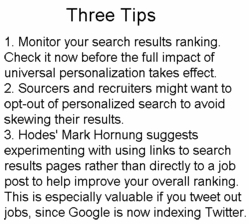 In a blog post of less than 300 words late Friday afternoon, Google announced changes to the way search results will be reported. From now on, the results of an identical keyword search could be different for each user.
In a blog post of less than 300 words late Friday afternoon, Google announced changes to the way search results will be reported. From now on, the results of an identical keyword search could be different for each user.
It’s been the case for some time that identical searches have produced slightly different rankings in the results depending on the searcher’s country or, in some cases, city. It’s also been the case that users with Google accounts get customized search results, based on their search histories.
Now, though, Google is extending the customization to all searchers unless they happen to reject cookies or figure out how to opt-out. The video offers Google’s explanation of how it works.
For recruiters, the implications of Google’s expanded Personalized Search are broad, if not entirely clear.
As Mark Hornung, SVP of Strategy with Bernard Hodes, wrote in a note tipping me to the development, “The long-term implications for SEO are interesting, to say the least. As with Sidewiki, however, it is impossible at this stage to predict what, exactly, the impact will be on recruiters and recruiting.”
One likely result is that employer branding will become even more important.
For example, a job seeker who regularly clicks into listings for brand-name firms will be offered fewer and fewer alternative companies at the top of the search results.
Hornung and I talked about what that could mean for other firms whose jobs may no longer make the first page of results.
A job seeker might miss out on a great job, because Google sees they mostly look at openings from only certain companies. There’s a potential, now, with this personalized search, for a “diminution of the serendipity factor,” Hornung agreed. He also suspects that candidate diversity may be impacted for the same reason.
“Those who don’t know about me or have an indifferent (or worse) opinion of my company will have even less chance of seeing my links in their results,” he says.
Google insists that it will still present the same array of results, though the results may be ranked differently.
“We want diversity of results,” Google’s product manager Johanna Wright, was quoted as saying. “This is something we talk about a lot internally and believe in. We want there to be variety of sources and opinions in the Google results. We want them in personalized search to be skewed to the user, but we don’t want that to mean the rest of the web is unavailable to them.”
Noted sourcer and Arbita EVP Shally Steckerl doubts that, at least in the short term, most companies will feel the effect.
The universal customization, says Steckerl, “is going to make something slightly more difficult for them that they weren’t doing anyway.”
What he means is that since most companies weren’t doing much in the way of search engine optimization in the first place they might never notice the impact. For the small percentage of employers who actively work to improve their rankings, “the gym just got moved 10 miles further,” he joked, referring to those unkept New Year’s resolutions about working out regularly.
For sourcers, Steckerl says the impact should be even smaller. Narrowly drawn, properly written Boolean searches for candidates, will still turn up the same list it did before personalized search.
 Recruiters can also opt-out of personalized search. And, says Steckerl, sourcers, unlike job seekers, typically conduct searches on a variety of engines. In fact, he suspects that Microsoft’s Bing.com might be the impetus for Google to make personalized searches universal.
Recruiters can also opt-out of personalized search. And, says Steckerl, sourcers, unlike job seekers, typically conduct searches on a variety of engines. In fact, he suspects that Microsoft’s Bing.com might be the impetus for Google to make personalized searches universal.
“Bing really is better at semantic search,” he says. “Bing is doing a better job of figuring out what you are looking for … This is Google trying to catch up.”
Hodes’ Hornung agrees that Google’s announcement Friday might be a response to Bing’s gain — slowly, and mostly at Yahoo’s expense — of market share.
Regardless of the reason, though, Hornung counsels employers to closely watch their search rankings.
I probably shouldn’t have to say this, but do the monitoring after opting out of the personalization program, lest you and others in the company skew the results.
Hornung warned about that in his initial email to me:
“One could envision a scenario where the employer believes that they rank highly on organic Google searches partially because the employer frequently does searches on their own jobs, thus skewing the profile and the results Google shows. It could also make a competitor appear better than it really is for the same reason.”
SEO is not a “once a year thing,” Hornung says. “You have to stay on top of it.” There are several firms, including Hodes, that provide monitoring and SEO services. But he admits that most companies simply won’t budget for it, even if they are aware of the need.